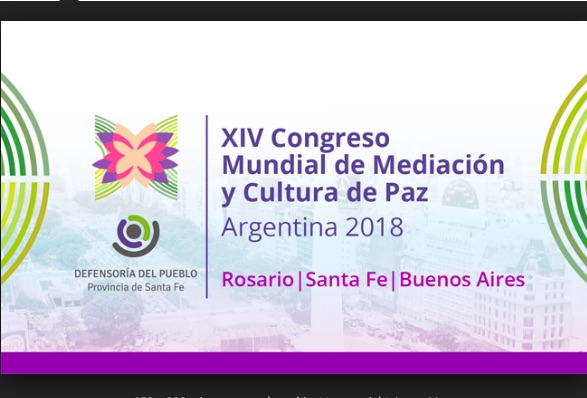… EDUCATION FOR PEACE …
An article by Alexis Rafael Peña Céspedes in El Dia
Every year the world announces a World Mediation Congress, where hundreds of mediators from the five continents of the planet meet and share experiences. This time it will be held in Buenos Aires, Argentina.

All citizens and professional people interested in knowing the mechanisms, of conflicts and mediations are invited to participate in this event that will interest those who want to train as mediators, conciliators, arbitrators and resolvers of conflicts.
According to the organizer of the event, Dr. Jorge Pesqueira Leal, “in the course of this century, we have met in Africa, the European Union and the American Continent, always with the commitment to contribute our knowledge and experience to open spaces for the harmonious and peaceful solution of conflicts.”
He adds that the world mediation congresses “have become the place where brilliant minds converge, bringing the latest advances in the most valuable methodology so that the protagonists of conflicts can unleash their creative potential and solve their disagreements.”
On this occasion, Argentina will host the XIV World Congress of Mediation and Culture of Peace, where citizens of the world will be promoters of peace in family spaces, neighborhood, work, sports, religion and others.
The organizing team of this event, highlighting Alternative Methods of Conflict and Dispute Resolution, indicate that “the XXI century opens space to fraternal, solidary and cooperative societies with peaceful coexistence, social justice and the common good. However, these have been weakened over time, so it is necessary to strengthen spaces designed to promote the culture of being, among which are new strategies of dialogue, mediation and conciliation at the intrapersonal interpersonal and group levels”.
They emphasize that “A person is violent or is peaceful depending on how she relates to herself. The family, the school or the community, are violent or peaceful depending, also, on how their protagonists are related, and the same thing happens with society in general. ”
(continued in right column)
Mediation as a tool for nonviolence and culture of peace
(continued from left column)
What is needed are commitments from states, international organizations, local governments and civil society, so that together they can make commitments aimed at fostering other mechanisms for resolving conflicts.
The organizers propose that, from this perspective, it is “urgent to change the way we relate, for which, mediation, in principle, but also dialogue, conciliation and restorative practices, are ideal mechanisms. They can deactivate the social construction of personalities prone to solve conflicts through force.” Force, as a mechanism, generates negative consequences for people and societies.
Therefore, “it is urgent to redouble efforts through the mediation world congresses, to contribute to society” in all continents “viable alternatives so that violence in the family, in the school and in the community, and conflicts are deactivated in all areas, including those that harm the life and evolution of nations and that place global security at risk ”
General objective
The general objective of the XIV World Congress of Mediation and Culture of Peace is to “Contribute to generate reflection spaces, promote initiatives in the private and public sphere and promote public policies that allow the prevention, management and transformation of situations and conflict spaces in Argentina, Latin America and the rest of the world, favoring the construction of more dialogue, tolerance and inclusive, equitable societies “.
Specific objectives
In addition the Congress has very clear and precise specific objectives to promote alternative methods of conflict resolution, as well as mechanisms of mediation, arbitration, conciliation, restorative justice or other viable methods.
These specific objectives, as described below, are proposed by the organizers ” to promote the exchange of experiences in mediation, conciliation, restorative practices and conflict transformation, which serve as input for the improvement of the different practices of dealing with conflicts.” These include the following:
Expand the fields of application of mediation, conciliation and restorative practices based on the experiences acquired in different countries of the world.
* Identify good practices for the prevention of violence, for social dialogue and for the transformation of conflicts on our planet.
* Analyze the achievements of state initiatives to strengthen alternative dispute resolution or self-regulatory justice mechanisms.
* Generate public policy guidelines that allow a more comprehensive and sustained management of conflicts by states.